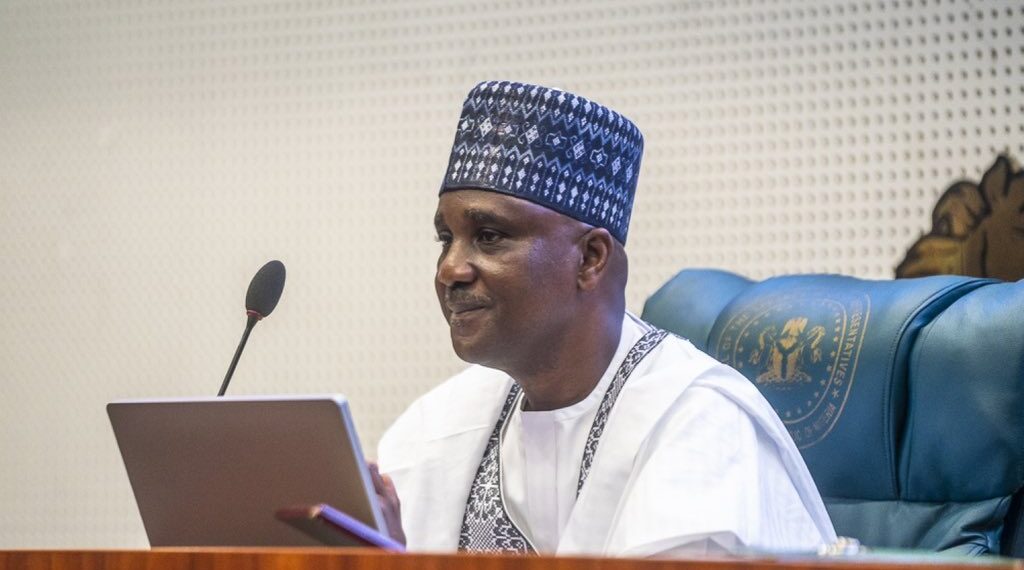Nigeria’s escalating debt burden has reached a critical juncture, posing a significant threat to the nation’s fiscal stability and long-term economic prospects. Speaker of the House of Representatives, Abbas Tajudeen, issued a stark warning, highlighting the nation’s breach of its statutory debt ceiling and emphasizing the urgent need for comprehensive reforms in borrowing practices and enhanced oversight. As of the first quarter of 2025, Nigeria’s total public debt soared to a staggering N149.39 trillion (approximately US$97 billion), a substantial increase from N121.7 trillion the previous year. This rapid accumulation of debt has pushed the debt-to-GDP ratio to approximately 52%, significantly exceeding the legally mandated 40% limit. This transgression signals a structural crisis demanding immediate parliamentary intervention and coordinated reform efforts to avert a potential economic downturn.
The burgeoning debt crisis is further exacerbated by the substantial portion of government revenue consumed by debt servicing, leaving limited resources for crucial investments in infrastructure, healthcare, and education, which are essential for sustainable development. The alarming reality is that Nigeria now allocates more funds to repaying loans than to vital social services, raising serious concerns about the long-term sustainability of the economy. This imbalance undermines the nation’s ability to invest in human capital and critical infrastructure, hindering economic growth and exacerbating social inequalities. The Speaker characterized the breach of the debt limit as a clear indication of strain on fiscal sustainability, underscoring the imperative for strengthened oversight mechanisms, transparent borrowing practices, and a collective commitment to ensuring tangible economic and social returns on every naira borrowed. He emphasized the need for a paradigm shift in borrowing practices, advocating for responsible borrowing that prioritizes investments that generate tangible economic and social benefits.
The Speaker’s warning resonates with the broader debt landscape across Africa, where numerous countries find themselves ensnared in a vicious cycle of spiraling debt service obligations. To mitigate these fiscal risks and promote responsible debt management within the region, Nigeria has taken the initiative to champion the establishment of a West African Parliamentary Debt Oversight Framework under the aegis of the West Africa Association of Public Accounts Committees (WAAPAC). This framework aims to harmonize debt reporting across West Africa, establish standardized transparency measures, and empower parliaments with access to timely data, enabling them to effectively scrutinize borrowing practices and ensure accountability. This regional collaboration is crucial in addressing the shared challenges posed by escalating debt levels and promoting sustainable fiscal management practices.
Complementing the regional framework, Nigeria is also spearheading a capacity-building program for Public Accounts and Finance Committees across West Africa. This initiative seeks to equip committee members with the necessary skills and tools for comprehensive debt sustainability analysis and fiscal risk assessment. By enhancing the technical expertise of parliamentary committees, the program aims to strengthen their oversight capabilities and promote more informed decision-making regarding public debt. While acknowledging the importance of borrowing as a tool for development financing, the Speaker cautioned against reckless debt accumulation, emphasizing that borrowing should be strategically directed towards investments in infrastructure, healthcare, education, and industries that stimulate job creation and poverty reduction. He unequivocally condemned reckless borrowing practices that fuel unsustainable consumption or corruption, stressing the need for accountability and transparency in the management of public funds.
The Speaker underscored the critical importance of parliamentary oversight, emphasizing that it extends beyond mere figures and encompasses the lives and futures of the citizens impacted by these financial decisions. He reiterated the 10th House’s unwavering commitment to transparency and accountability in public finance, outlining its Open Parliament Policy, which mandates public hearings for all major borrowing proposals and ensures the accessibility of simplified debt reports to the public. This commitment to transparency aims to foster public engagement and ensure that citizens are informed about the nation’s debt situation and the government’s borrowing practices. The Speaker urged conference participants to engage in thoughtful and dedicated deliberations, emphasizing that the resolutions reached would play a vital role in strengthening fiscal responsibility and accountability across the African continent.
In conclusion, Nigeria’s mounting debt crisis presents a significant challenge to the nation’s economic stability and future prospects. The Speaker’s warning serves as a wake-up call for urgent action, highlighting the need for comprehensive reforms in borrowing practices, enhanced parliamentary oversight, and a collective commitment to responsible debt management. The establishment of a regional debt oversight framework and capacity-building program demonstrate Nigeria’s proactive approach to addressing this critical issue and promoting sustainable fiscal practices across West Africa. The emphasis on transparency, accountability, and citizen engagement is crucial in ensuring that borrowing decisions serve the best interests of the nation and contribute to long-term economic development and social progress. The future of Nigeria’s economic well-being hinges on the implementation of sound fiscal policies, responsible debt management, and a commitment to investing in human capital and critical infrastructure.


